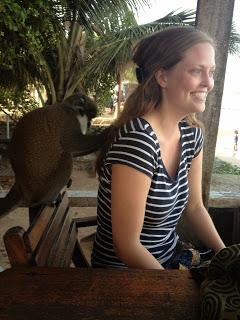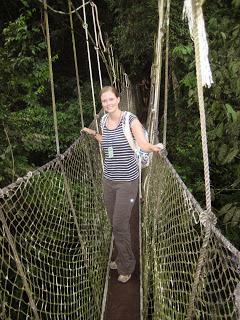This is the second and final posting on my field experience and thesis research in Ghana. As mentioned in Part I, this section will focus on the research I conducted for my Master’s thesis. I had learned and practiced conducting cross-cultural research in one community, and I was hoping that knowledge would transfer to another.
Part I left off with me waiting at the Wechiau Community Hippo Sanctuary (WCHS) for the approval of my amended ethics review, which would allow me to conduct research on voluntourism in Busua. Fortunately, I was already ethically approved conduct research in the WCHS, so that is what I did. Like I mentioned, there were no volunteers in the WCHS at the time, but there were enough people who remembered what it was like when volunteers came to the WCHS, so I asked them about their experiences. But first I had to say goodbye to my friends in the Ghana Research and Study Tour (GRST) as they went up to Mole National Park while I stayed behind at the sanctuary.
Being in the community for two week prior to starting my own research was definitely beneficial. Almost everyone I interviewed recognized me from being with the GRST and was willing to talk with me. It was nice to speak to the locals one on one, instead of being in big focus groups because I got to hear some interesting stories, which may not have come out in a group context. My translator was also well known in the community, so I think my participants felt more comfortable when he was there, and therefore, it made them more willing to talk. Some participants were grateful that I came to talk to them, and said I refreshed their memory about the past. I was even given an entire bowlful of groundnuts, which are essentially peanuts. I was really appreciative of this gift, but I am allergic to peanuts, and I it would have been inappropriate for me to refuse. I ended up carrying the nuts around with me throughout Ghana and sharing them with whoever wanted them. However, the research experience in the WCHS was completely different in Busua.
Far away from the hippo sanctuary, Busua is located on the coast of Ghana on one of the nicest beaches in the country. I met up with the girls on the GRST again and they were conducting their own individual projects in Busua. The GRST has never conducted research in Busua before, but briefly visited the town the previous year. This meant the people of Busua did not have years of experience with VIU students as the WCHS did. Once again, we tried to meet with the Chief to get approval to conduct research in the community, but he was out of town. We eventually met with the Chairman of the Town Tourism and Development Committee, who was representing the Chief, and he gave us permission.
I still had not received approval on my amended ethics, so I had to wait around a few days. Busua is a great place to wait around because it has a great beach, but I was also trying to recover from a nasty cold that I developed a few weeks before. Despite the cold, I did manage to spend a lot of time walking on the beach, hanging out at the surf shop, and visiting various bars along the beach. Busua has a lot more tourist activity, and it has more volunteer activity, so I met people from all over the world, including some Canadians. It turns out that a pair of Canadians met up with another VIU recreation and tourism professor when they were at Mole National Park. Small world!
Once I did get approval from the ethics board, it was time again to say goodbye to the GRST as they headed east, and I was once again alone in the community. When I started my interviews, I quickly realized that conducting research in Busua was going to be different than in the WCHS. Since the locals were less familiar with researchers, they were less comfortable talking to me, giving me information, and it was harder to make a time when I could interview them. However, I found that the more I talked to people the more they opened up. I did not have a research assistant this time, but most of the locals I talked to spoke English. I did have a connection in the community, and he helped me arrange my interviews and introduced me some of the locals I could interview. He accompanied me on a few of these interviews, which like in the WCHS, made the locals more comfortable. Everything I learned about cultural sensitivity in the WCHS came in very handy in Busua. I dressed appropriately, which meant covering up my knees and shoulders, although many tourists I saw were not doing the same. I told all my participants that I would share my findings with the community, and sometimes this made them more willing to talk. The more time I spent in the community, and the more people I got to know, the easier it was to conduct my research.
I am very glad that I chose to go to Busua to conduct my research, and I am glad I stayed at the WCHS. Both communities were different in so many ways, so I was always adjusting to new situations. I learned to not rely too much on my plan because it was constantly changing. There were times I had to be persistent, and times where I just had to wait and let things happen. Everyday was different. It was sometimes really stressful and frustrating, and sometimes really fun. Right now I am in the process of analyzing all the interviews I conducted, and I am looking forward to see what comes out of them. So although my experience in Ghana didn’t go exactly as I planned it in my head, I think everything worked out for the best.


